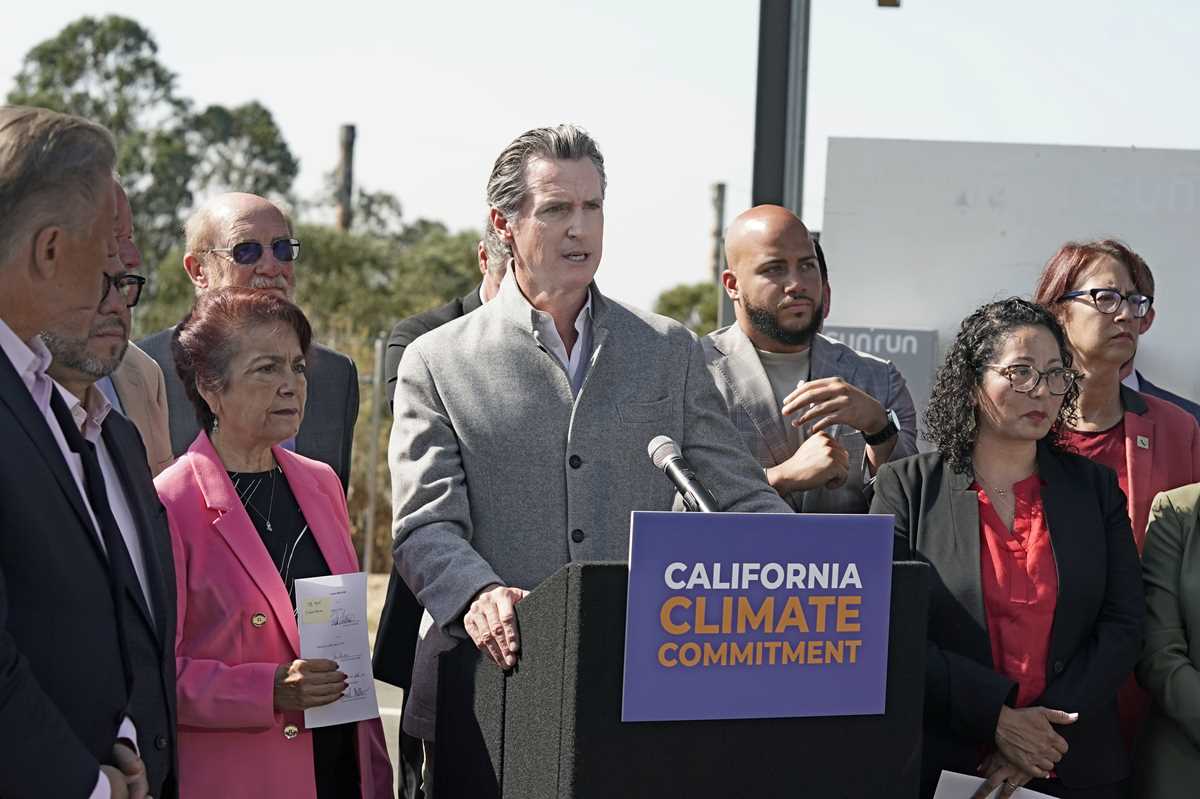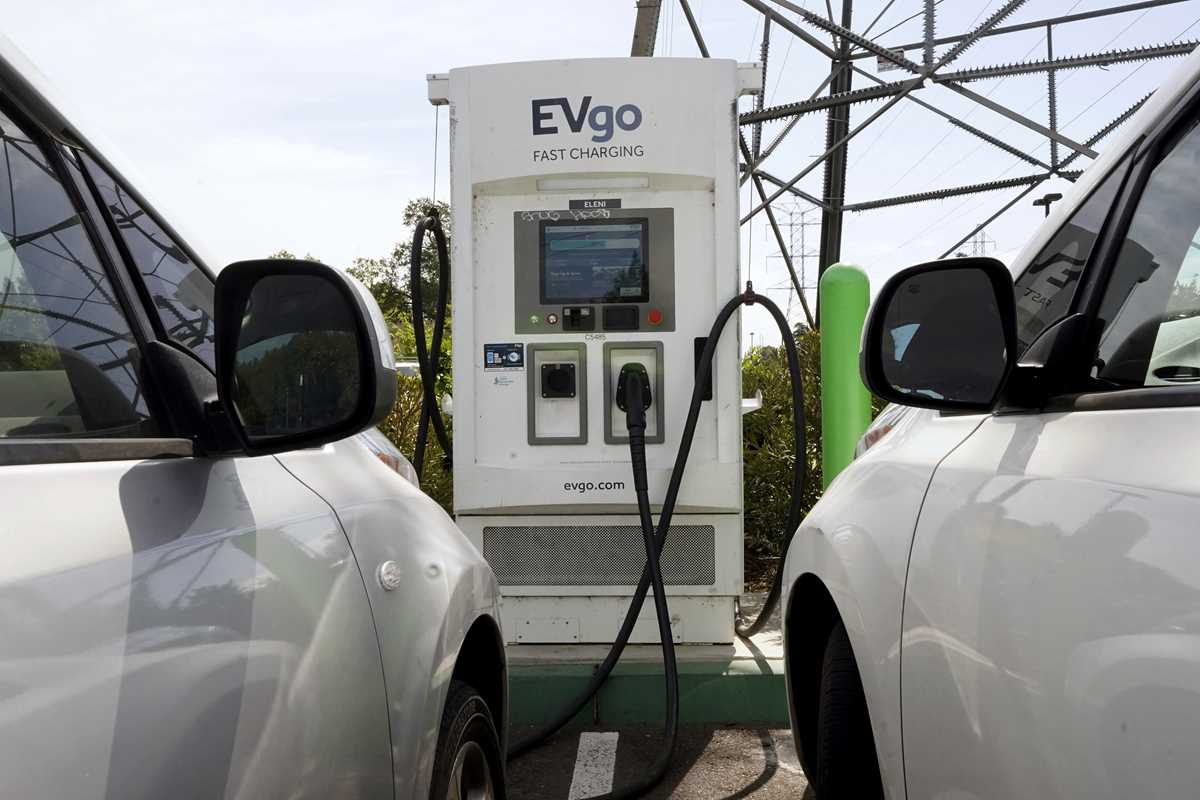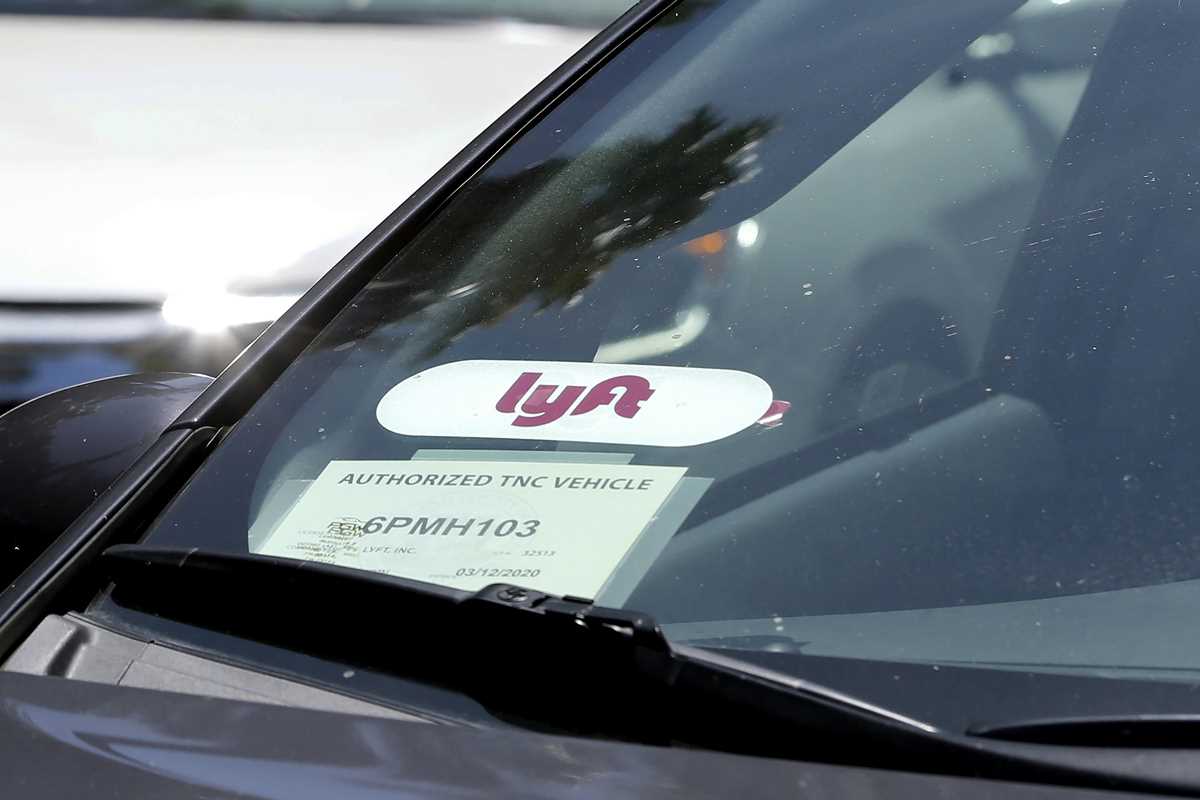 Gov. Gavin Newsom, center, is flanked by state lawmakers while discussing the package of legislation he signed that accelerates the climate goals of the nation's most populous state, at Mare Island in Vallejo, Calif., Friday, Sept. 16, 2022. Newsom opposes Proposition 30, which would raise taxes on people making more that $2 million to pay for electric vehicle infrastructure and firefight resources. (AP Photo/Rich Pedroncelli, File)
Gov. Gavin Newsom, center, is flanked by state lawmakers while discussing the package of legislation he signed that accelerates the climate goals of the nation's most populous state, at Mare Island in Vallejo, Calif., Friday, Sept. 16, 2022. Newsom opposes Proposition 30, which would raise taxes on people making more that $2 million to pay for electric vehicle infrastructure and firefight resources. (AP Photo/Rich Pedroncelli, File) Electric cars are parked at a charging station in Sacramento, Calif., Wednesday, April 13, 2022. Proposition 30, which has has divided Democrats, would add a tax on the highest earners, with most of the money going toward building charging stations and helping people buy electric cars. (AP Photo/Rich Pedroncelli, File)
Electric cars are parked at a charging station in Sacramento, Calif., Wednesday, April 13, 2022. Proposition 30, which has has divided Democrats, would add a tax on the highest earners, with most of the money going toward building charging stations and helping people buy electric cars. (AP Photo/Rich Pedroncelli, File) A Lyft ride-share car waits at a stoplight in Sacramento, Calif., July 9, 2019. Lyft is the primary funders of Proposition 30, which would raise taxes on the rich to pay mostly for electric vehicle infrastructure. (AP Photo/Rich Pedroncelli, File)
A Lyft ride-share car waits at a stoplight in Sacramento, Calif., July 9, 2019. Lyft is the primary funders of Proposition 30, which would raise taxes on the rich to pay mostly for electric vehicle infrastructure. (AP Photo/Rich Pedroncelli, File)SACRAMENTO, Calif. (AP) — A California ballot measure that would raise taxes on the richest residents to help put more electric vehicles on the roads was trailing Tuesday with about one-third of votes counted.
Proposition 30 would place a new 1.75% tax on incomes above $2 million, which is estimated to be fewer than 43,000 taxpayers. It would raise billions annually, with most going to help subsidize the purchase of electric vehicles and construction of charging stations. Twenty percent of the money would go toward boosting resources to fight wildfires.
The “no" side had 57% of the vote after initial counting.
The fight over Proposition 30 comes as California races to reduce emissions from transportation — by far the largest source — and meet its ambitious climate goals. Wildfires, meanwhile, are spewing more carbon into the air as they become larger and more destructive, threatening to set back the state’s progress.
Democratic Gov. Gavin Newsom, who won a second term Tuesday, does not support the measure. That's despite his administration's policy banning the sale of most new gas-powered cars in the state in 2035. His stance puts him opposite the state Democratic Party and a number of environmental and public health organizations.
Newsom has called it a taxpayer-funded giveaway to rideshare companies, which under California regulations must ensure nearly all trips booked through their services are zero-emission by 2030. Lyft supplied most of the “yes” campaign’s funding; competitor Uber has not taken a position.
Backers of the measure, including most major environmental groups, say the state needs a dedicated, robust source of funding to set up infrastructure that can handle more plug-in cars and to help Californians of all income levels to buy them. The money won’t go exclusively to passenger cars; the state could also tap it to put cleaner delivery trucks, buses and even e-bikes on the roads. A portion of the money must go to help people in low-income or disadvantaged communities buy or access electric cars.
Parts of Southern California and the Central Valley have some of the worst air quality in the country. Cleaning up pollution from cars, diesel trucks and public transit is essential to help the state meet its climate goals and protect public health, said Eli Lipmen, executive director for Move LA, one of the organization's behind the measure.
The measure provides an opportunity “to ensure that Californians who deserve the best air quality in the country actually get that," he said.
This year, about 18% of new car sales have been for fully electric or hybrid cars, according to Newsom’s office. That will have to double by 2026 to meet new state mandates for car sales. Newsom has dedicated $10 billion over six years for various electric transportation programs, and the Biden administration has set aside $5 billion over five years to build a network of highway charging stations in every state.
Rideshare companies like Lyft do not own the vehicles their drivers use, but they are still on the hook to ensure that trips booked through their app will be zero-emission. Proposition 30 does not include any provisions that exclusively benefit Lyft. But Newsom and other opponents say the measure would allow Lyft to rely on taxpayer dollars, not company money, to help its drivers transition to electric cars.
“Put simply, Prop 30 is a Trojan Horse that puts corporate welfare above the fiscal welfare of our entire state," Newsom says in a television ad against the measure.
Supporters of the measure, though, say an effort to raise taxes on the rich to boost electric vehicle adoption was in the works before Lyft got involved.
Other opponents included the California Chamber of Commerce and the California Teachers Association. Logging companies and numerous wealthy individuals also contributed money to the “no” campaign.
It’s not the first time California voters have been asked to raise taxes on millionaires to pay for special programs. In 2004, they approved a ballot measure that raised taxes by 1% on incomes above $1 million to fund mental health services.
___
Follow AP’s coverage of the elections at: https://apnews.com/hub/2022-midterm-elections
Check out https://apnews.com/hub/explaining-the-elections to learn more about the issues and factors at play in the 2022 midterm elections.
Before you consider Uber Technologies, you'll want to hear this.
MarketBeat keeps track of Wall Street's top-rated and best performing research analysts and the stocks they recommend to their clients on a daily basis. MarketBeat has identified the five stocks that top analysts are quietly whispering to their clients to buy now before the broader market catches on... and Uber Technologies wasn't on the list.
While Uber Technologies currently has a "Moderate Buy" rating among analysts, top-rated analysts believe these five stocks are better buys.
View The Five Stocks Here
Wondering what the next stocks will be that hit it big, with solid fundamentals? Click the link below to learn more about how your portfolio could bloom.
Get This Free Report